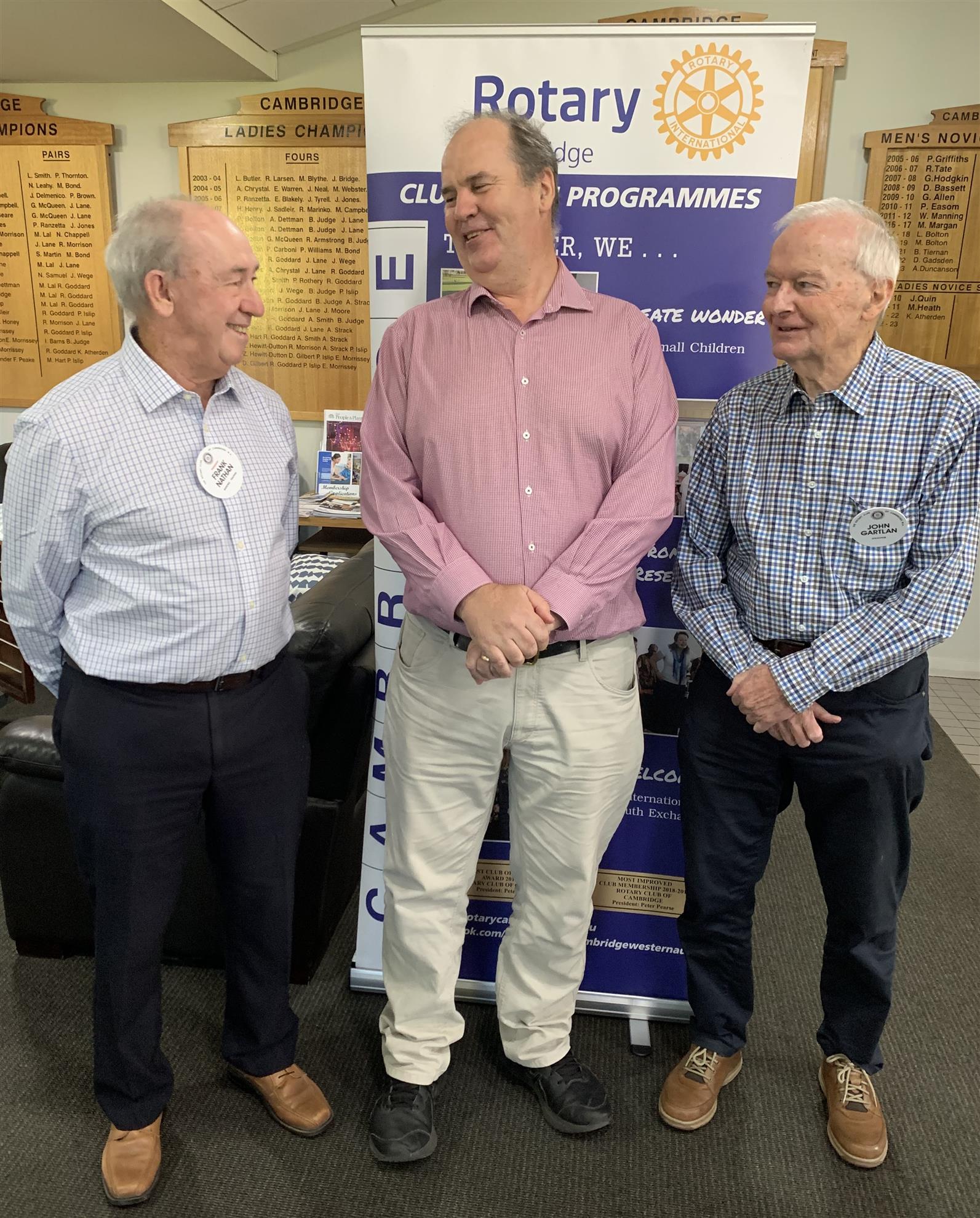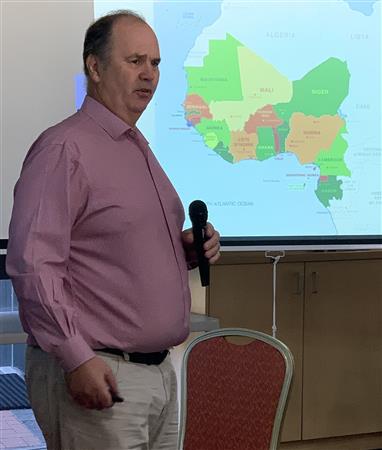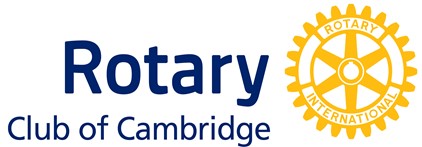
 We don’t often get the opportunity to learn about distant lands, but this week was an exception! We were fortunate to welcome Bernard Aylward, a geologist who has had a lot of experience in Africa - especially in Mali and Ghana. Mali is a landlocked country in West Africa, and although it is about half the size of WA, it has a population of around 21 million people. 13 different languages are spoken there, and the capital Bamako has a largely hot and dry climate – often reaching a maximum of 45 degrees Celsius. Malaria is endemic to the region, and cholera, meningitis and yellow fever also prevail. 46% of the Mali population lives below the poverty line, and much subsistence farming takes place. The country is largely desert in the north and savannah grassland in the south, and the predominantly Muslim population still relies on witchdoctors and mystical healers. Many people fish in the Niger river which flows through the land, and it is host to a range of wildlife but also a high degree of pollution. Mali exports cotton and also produces a shiny cotton-based fabric called Bazin. Bernard’s company is working on a lithium project at present, and this will be exported via the Ivory Coast. The company supports the local community in many ways including paying for a teacher and various facilities at the local school which has about 50 pupils. 30% of the country’s power comes from hydroelectric plants, but these often shut down for several hours a day. Mali is certainly an interesting place in spite of its circumstances
We don’t often get the opportunity to learn about distant lands, but this week was an exception! We were fortunate to welcome Bernard Aylward, a geologist who has had a lot of experience in Africa - especially in Mali and Ghana. Mali is a landlocked country in West Africa, and although it is about half the size of WA, it has a population of around 21 million people. 13 different languages are spoken there, and the capital Bamako has a largely hot and dry climate – often reaching a maximum of 45 degrees Celsius. Malaria is endemic to the region, and cholera, meningitis and yellow fever also prevail. 46% of the Mali population lives below the poverty line, and much subsistence farming takes place. The country is largely desert in the north and savannah grassland in the south, and the predominantly Muslim population still relies on witchdoctors and mystical healers. Many people fish in the Niger river which flows through the land, and it is host to a range of wildlife but also a high degree of pollution. Mali exports cotton and also produces a shiny cotton-based fabric called Bazin. Bernard’s company is working on a lithium project at present, and this will be exported via the Ivory Coast. The company supports the local community in many ways including paying for a teacher and various facilities at the local school which has about 50 pupils. 30% of the country’s power comes from hydroelectric plants, but these often shut down for several hours a day. Mali is certainly an interesting place in spite of its circumstances.

 We don’t often get the opportunity to learn about distant lands, but this week was an exception! We were fortunate to welcome Bernard Aylward, a geologist who has had a lot of experience in Africa - especially in Mali and Ghana. Mali is a landlocked country in West Africa, and although it is about half the size of WA, it has a population of around 21 million people. 13 different languages are spoken there, and the capital Bamako has a largely hot and dry climate – often reaching a maximum of 45 degrees Celsius. Malaria is endemic to the region, and cholera, meningitis and yellow fever also prevail. 46% of the Mali population lives below the poverty line, and much subsistence farming takes place. The country is largely desert in the north and savannah grassland in the south, and the predominantly Muslim population still relies on witchdoctors and mystical healers. Many people fish in the Niger river which flows through the land, and it is host to a range of wildlife but also a high degree of pollution. Mali exports cotton and also produces a shiny cotton-based fabric called Bazin. Bernard’s company is working on a lithium project at present, and this will be exported via the Ivory Coast. The company supports the local community in many ways including paying for a teacher and various facilities at the local school which has about 50 pupils. 30% of the country’s power comes from hydroelectric plants, but these often shut down for several hours a day. Mali is certainly an interesting place in spite of its circumstances.
We don’t often get the opportunity to learn about distant lands, but this week was an exception! We were fortunate to welcome Bernard Aylward, a geologist who has had a lot of experience in Africa - especially in Mali and Ghana. Mali is a landlocked country in West Africa, and although it is about half the size of WA, it has a population of around 21 million people. 13 different languages are spoken there, and the capital Bamako has a largely hot and dry climate – often reaching a maximum of 45 degrees Celsius. Malaria is endemic to the region, and cholera, meningitis and yellow fever also prevail. 46% of the Mali population lives below the poverty line, and much subsistence farming takes place. The country is largely desert in the north and savannah grassland in the south, and the predominantly Muslim population still relies on witchdoctors and mystical healers. Many people fish in the Niger river which flows through the land, and it is host to a range of wildlife but also a high degree of pollution. Mali exports cotton and also produces a shiny cotton-based fabric called Bazin. Bernard’s company is working on a lithium project at present, and this will be exported via the Ivory Coast. The company supports the local community in many ways including paying for a teacher and various facilities at the local school which has about 50 pupils. 30% of the country’s power comes from hydroelectric plants, but these often shut down for several hours a day. Mali is certainly an interesting place in spite of its circumstances.